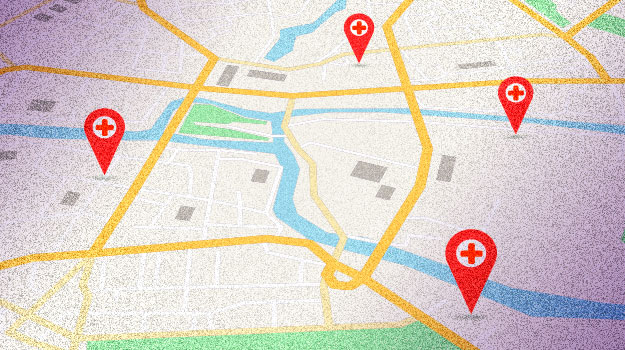Career resources content posted on NEJM CareerCenter is produced by freelance health care writers as an advertising service of NEJM Group, a division of the Massachusetts Medical Society and should not be construed as coming from, or representing the views of, the New England Journal of Medicine, NEJM Group, or the Massachusetts Medical Society
Arriving prepared and being highly professional are key, but physicians should also plan their ‘downtime’
By Bonnie Darves
When residents near the end of training, nothing says “you’re almost there!” quite as dramatically as the act of setting the date for the first onsite job interview. For physicians, those basic phone or email transactions validate both the years of hard work and the fact that they’ll soon start their first practice position — somewhere.
Even if the prospective employer or the organization’s recruiter initiated the conversation that led to scheduling the site visit, that doesn’t mean the job is guaranteed. Physicians should prepare for any site visit as if they’re not the only candidates in the running. If the opportunity is in a highly desirable organization or location, there’s a very good chance that other physicians are also being considered.
In other words, treat the site visit as the important event that it is: making the most of that day or two onsite and presenting as a consummate professional. “It’s important for residents to keep in mind that the site visit is a job interview, first and foremost, and that their demeanor and appearance really matter,” said Lynne Peterson, director of physician and advanced practice recruitment for Fairview Health Services in Minneapolis, Minnesota. “I have seen physicians show up wearing clothes that are far too casual, and that comes across as unprofessional.”
What’s too casual? “It is not a good idea to show up wearing a polo shirt and casual slacks,” said Joelle Hennesey, manager of physician services for First Physicians Group and Sarasota Memorial Hospital in Sarasota, Florida. “Wear business attire, and when in doubt, don’t worry about being overdressed.” Ms. Hennesey pointed out that most of the young physicians she encounters are dressed for the occasion, but it’s more often experienced physicians who commit the dress faux pas. “Then, as recruiters, we’re faced with trying to figure out whether the wrong attire choice was just a personality quirk,” she said.
Allen Kram, director of physician development for Westchester Medical Center, in Valhalla, New York, reminds residents that professional attire, the candidate’s first opportunity to make an impression on arrival, sets the tone. “Dress is unequivocally important. Men should wear a clean, pressed dress shirt and jacket, and women, the corollary to that. That’s the standard of etiquette for an onsite interview,” said Mr. Kram, a board member of the Association of Physician Staff Recruiters (ASPR). He and other recruiters interviewed indicated that residents might not receive sufficient coaching from their program staff on this aspect of the site visit.
Act — and be — prepared for the interview
Ideally, physicians planning for an onsite interview should prepare for the visit a week or two in advance. This preparation process should be fairly straightforward, depending on the practice opportunity. There is an abundance of information available online today about many health care organizations and the geographic areas and markets in which they operate. This means that physicians should arrive reasonably well informed. “It’s pretty easy now to do research on a practice, facility, or organization, and the prospective employer will expect the resident or fellow to have done that research,” said Craig Fowler, immediate past president of the National Association of Physician Recruiters and vice president of training, recruiting, and public relations for Pinnacle Health Group in Atlanta, Georgia. “There’s no excuse for being unprepared for this aspect of the site visit, and I often remind residents that being uninformed could give the impression that they’re not highly interested in the opportunity, even when they are.”
The most efficient way to obtain a basic grounding on a practice, facility, or academic institution is to first review the organization’s website and ask the recruiter to provide background information. If candidates aren’t familiar with the geographic region or the health care environment within the area in question, they might find it helpful to look at both business and general-interest publications websites.
If possible, residents should reach out through professional channels to learn more about the organization or facility before the visit. This might entail asking training program faculty members if they have any contacts in the region, or tapping into the medical school or residency alumni networks to identify physicians who might have a helpful perspective.
The star candidates, Mr. Kram, a veteran recruiting professional, points out, “are those who show me and our [interviewing] physicians and administrators that they’ve done some checking – and that they’ve networked enough to know about the organization’s history, and its physicians or its research.” Knowing in advance, for example, that a health care system operates six hospitals and a large clinic network, or is well known for its cardiac care, will help the candidate steer the conversation toward how any of the attributes might affect the opportunity.
Ms. Hennesey observed that being prepared is also ultimately a matter of courtesy. Organizations have generally gone through considerable time and expense to prepare for a candidate’s visit and schedule meetings with very busy physicians and administrators. As such, showing up unprepared or acting as if the site visit is just a casual opportunity to meet and greet could offend the hosting institution. It also could waste the candidate’s time, if doing some homework might have ruled out a less-than-ideal opportunity.
“Young physicians should keep in mind that the number of site visits they can make is a finite number, and they should choose accordingly,” Mr. Kram said. He and other sources stressed that candidates should never accept the offer of a site visit if they’re not truly interested in exploring the opportunity.
Answer — and ask — the important questions
When candidates prepare for onsite interviews, they should first be ready to answer questions succinctly and professionally. At the same time, candidates should also be ready to ask questions of the physicians and administrators who participate in the interviews.
Of course, it’s not always possible to predict the questions that will be asked. However, physicians should have a ready, ideally rehearsed answer to two all-important ones they’re likely to hear: What do you think you would bring to our organization, and why are you interested in this opportunity?
The recruiters who contributed to this article reported nearly unanimously that most candidates can readily speak to how they’re qualified to succeed clinically in the position. That’s not necessarily the case when candidates are asked why they are interested in the position, recruiters said.
“Physicians should not answer the question by just saying ‘my family lives in New Jersey,’” Mr. Kram advised.
“In my experience, the smart candidates really do their homework before they come for the site visit, and they come because they’re interested in our organization or their prospective colleagues,” Ms. Hennesey said.
It’s also advisable for the candidate to ask specific questions during onsite interviews and conversations. “I sometimes think there’s a misunderstanding among residents about this,” said Ms. Peterson. Prospective colleagues and other interviewers are in fact expecting questions from candidates, and they might be disappointed if those questions aren’t posed, she said.
It is recommended, for example, that candidates ask specific questions about practice scope, procedure expectations, patient volumes and scheduling practices, operating room availability, organizational culture, and the organization’s position in the marketplace and plans for growth, to name a few important ones. “Asking questions demonstrates a level of engagement and interest on the candidate’s part. The key is to ask the questions respectfully,” Ms. Peterson said.
On a deeper level, physician candidates are also encouraged to ask strategic questions during the interviews. Candidates might ask about the organization’s perceived strengths and weaknesses, for example, with an eye to how their own qualifications might help the practice or facility address the latter. In this climate of consolidation in health care, it’s also appropriate to ask whether the organization is contemplating a purchase, merger, or affiliation — or the prospective addition or removal of a particular clinical service — that might affect the candidate’s own professional future.
Recruiters agree that candidates should reserve the formal interview forum primarily for addressing position-related questions, not to ask about things like recreational opportunities or schools. The community tour or conversations with real estate professionals is the appropriate time and place for those inquiries.
“If you’re not sure what to ask during the interview, go to your program faculty leaders and ask them what they might ask, if they were getting ready for that particular site visit,” said Ms. Peterson. “Their guidance can be very helpful.”
“Candidates who have done research on the compensation in their specialty and who are concerned about ensuring they receive a certain salary level actually should ask questions of the recruiter before they schedule the site visit,” Ms. Peterson said. “At the very least, it’s OK for candidates to ask whether the expected compensation range is competitive with the range in their specialty and in that region, before proceeding.”
Candidates who have a successful site visit and are very interested in the position should let their key interviewers know that right away, said Nahry Minars, president and chief executive officer of ProMedical Staffing, LLC, in Washington, D.C. “Candidates should always send a thank you to the prospective colleagues and the recruiter, ideally soon after they leave town and before they get back to their busy lives,” she said, adding that she advises sending that note within 48 hours, to all key individuals. “That thank-you note is the perfect vehicle for letting the people you met know that you’re very interested in the opportunity — and asking if they need anything else from you, so that your note requires a response. Waiting too long to let them know your interest can give the wrong impression.”
Other site-visit do’s and don’ts: the short list
Physicians who accept the offer of a site visit should plan ahead. To that end, the recruiters offered these additional tips:
Do request “downtime” — a few hours or an entire day, if needed — to check out the area alone. Most organizations will arrange a community tour of some sort if the site visit will be more than a single day (some organizations, as a rule, use a two-visit model, and reserve that return visit for seeing the community). Physicians who really want some time alone or with a significant other to explore the community should ensure that’s set aside ahead of time.
Don’t forget that everyone you encounter onsite is important, and treat all with the same degree of respect. A candidate’s inappropriate or discourteous behavior to anyone may raise questions about the candidate’s suitability for the position. Behaving inappropriately can “sink the opportunity quickly,” as one recruiter put it.
Do ask if a spouse or partner can accompany you. Although most organizations are willing to accommodate a candidate’s significant other, it’s still a good idea to clear that person’s prospective presence (and be clear about any associated expenses) ahead of time with the recruiter.







